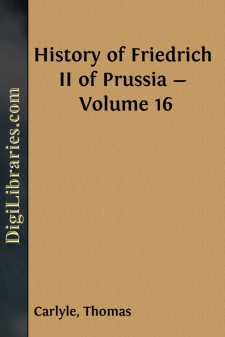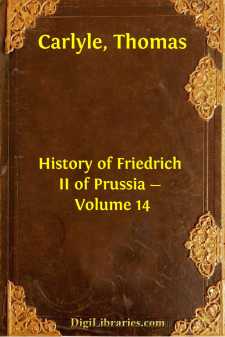Categories
- Antiques & Collectibles 13
- Architecture 36
- Art 48
- Bibles 22
- Biography & Autobiography 813
- Body, Mind & Spirit 142
- Business & Economics 28
- Children's Books 17
- Children's Fiction 14
- Computers 4
- Cooking 94
- Crafts & Hobbies 4
- Drama 346
- Education 46
- Family & Relationships 57
- Fiction 11829
- Games 19
- Gardening 17
- Health & Fitness 34
- History 1377
- House & Home 1
- Humor 147
- Juvenile Fiction 1873
- Juvenile Nonfiction 202
- Language Arts & Disciplines 88
- Law 16
- Literary Collections 686
- Literary Criticism 179
- Mathematics 13
- Medical 41
- Music 40
- Nature 179
- Non-Classifiable 1768
- Performing Arts 7
- Periodicals 1453
- Philosophy 64
- Photography 2
- Poetry 896
- Political Science 203
- Psychology 42
- Reference 154
- Religion 513
- Science 126
- Self-Help 84
- Social Science 81
- Sports & Recreation 34
- Study Aids 3
- Technology & Engineering 59
- Transportation 23
- Travel 463
- True Crime 29
Sort by:
by:
Thomas Carlyle
Chapter I.—PREFATORY. The Twelve Hercules-labors of this King have ended here; what was required of him in World-History is accomplished. There remain to Friedrich Twenty-three Years more of Life, which to Prussian History are as full of importance as ever; but do not essentially concern European History, Europe having gone the road we now see it in. On the grand World-Theatre the curtain has fallen...
more...
by:
Thomas Carlyle
CHAPTER I. INTRODUCTORY. Near seven years ago, a short while before his death in 1844, John Sterling committed the care of his literary Character and printed Writings to two friends, Archdeacon Hare and myself. His estimate of the bequest was far from overweening; to few men could the small sum-total of his activities in this world seem more inconsiderable than, in those last solemn days, it did to...
more...
by:
Thomas Carlyle
CHAPTER I. HARALD HAARFAGR. Till about the Year of Grace 860 there were no kings in Norway, nothing but numerous jarls,—essentially kinglets, each presiding over a kind of republican or parliamentary little territory; generally striving each to be on some terms of human neighborhood with those about him, but,—in spite of "Fylke Things" (Folk Things, little parish parliaments), and small...
more...
by:
Thomas Carlyle
INTRODUCTION Being an appreciation from "The Dial" (July 1843) by Ralph Waldo Emerson Here is Carlyle's new poem, his Iliad of English woes, to follow his poem on France, entitled the History of the French Revolution. In its first aspect it is a political tract, and since Burke, since Milton, we have had nothing to compare with it. It grapples honestly with the...
more...
by:
Thomas Carlyle
CHAPTER I. PRELIMINARY. Considering our present advanced state of culture, and how the Torch of Science has now been brandished and borne about, with more or less effect, for five thousand years and upwards; how, in these times especially, not only the Torch still burns, and perhaps more fiercely than ever, but innumerable Rushlights, and Sulphur-matches, kindled thereat, are also glancing in every...
more...
by:
Thomas Carlyle
Chapter I.—SANS-SOUCI. Friedrich has now climbed the heights, and sees himself on the upper table-land of Victory and Success; his desperate life-and-death struggles triumphantly ended. What may be ahead, nobody knows; but here is fair outlook that his enemies and Austria itself have had enough of him. No wringing of his Silesia from this "bad Man." Not to be overset, this one, by never such...
more...
by:
Thomas Carlyle
Chapter I.—FRIEDRICH RESUMES HIS PEACEABLE PURSUITS. Friedrich's own Peace being made on such terms, his wish and hope was, that it might soon be followed by a general European one; that, the live-coal, which had kindled this War, being quenched, the War itself might go out. Silesia is his; farther interest in the Controversy, except that it would end itself in some fair manner, he has none....
more...
by:
Thomas Carlyle
Chapter I. — BRANNIBOR: HENRY THE FOWLER. The Brandenburg Countries, till they become related to the Hohenzollern Family which now rules there, have no History that has proved memorable to mankind. There has indeed been a good deal written under that title; but there is by no means much known, and of that again there is alarmingly little that is worth knowing or remembering. Pytheas, the Marseilles...
more...
by:
Thomas Carlyle
Chapter I. — KURFURST FRIEDRICH I. Burggraf Friedrich, on his first coming to Brandenburg, found but a cool reception as Statthalter. ["Johannistage" (24 June) "1412," he first set foot in Brandenburg, with due escort, in due state; only Statthalter (Viceregent) as yet: Pauli, i. 594, ii. 58; Stenzel, Geschichte des Preussischen Staats (Hamburg, 1830, 1851), i. 167-169.] He came as...
more...
by:
Thomas Carlyle
CORRESPONDENCE OF CARLYLE AND EMERSON LXXVI. Emerson to Carlyle Concord, 1 July, 1842 My Dear Carlyle,—I have lately received from our slow friends, James Munroe & Co., $246 on account of their sales of the Miscellanies,—and I enclose a bill of Exchange for L51, which cost $246.50. It is a long time since I sent you any sketch of the account itself, and indeed a long time since it was posted,...
more...











